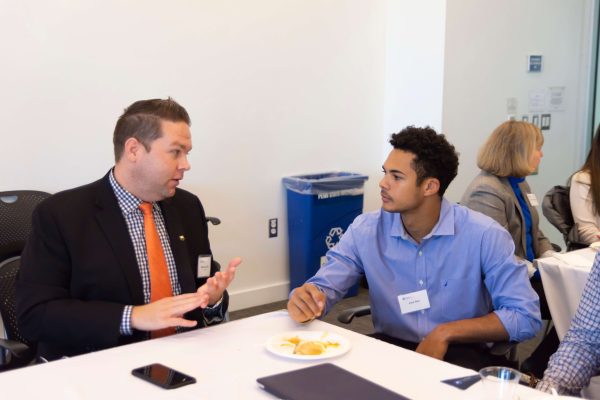Through the Liberal Arts Alumni Mentor Program, Liberal Arts alumni serve as mentors to undergraduate students. They help students navigate their Penn State experience and plan for life after graduation. This can include providing advice on internships, guidance on academic choices, career exploration, graduate school evaluation, and more. The Liberal Arts Alumni Mentor Program is a wonderful way for alumni to stay connected to Penn State and to inspire the next generation of alumni.

Understanding the Program
What is mentorship?
The Liberal Arts Alumni Mentor Program pairs Liberal Arts alumni with current student mentees in a year-long mentoring relationship. Mentorship is a process in which an experienced individual helps another person develop goals and skills through on-going, supportive conversations and learning exercises.
The role of the alumni mentor is to engage and participate in the process with their mentee by providing insight, guidance, and support based on personal experience in career and academic pursuits.
The role of the student mentee is to engage and participate in the process with their mentor to gain guidance in career development and exploration, goal setting, and decision making.
What can I expect from this program?
As a mentor, you can be a part of your mentee’s growth. Mentors provide students with recognition, support, challenge, and inspiration. Your student will ask you questions, and you should raise questions as well.
In this program, you will:
- Serve as a resource, provide guidance, share expertise, and provide feedback.
- Assist with internship and job searches.
- Encourage students to tackle challenges and develop new skills.
- Advise students on how to successfully navigate their way through Penn State.
- Assist students as they transition from college life to work life or graduate school.
- Provide students with additional resources if they need extra support.
Apply Now
- Already have an account? Sign in and go to “My Profile” then Additional Information and select College of the Liberal Arts as your Penn State college.
- Need an account? Click Join Today and follow the prompts. Note: This can be expedited by auto-filling information from your LinkedIn profile, but they will ask for permissions you may be uncomfortable with granting. If so, we recommend signing up with the email address you use to receive emails from Penn State.
Join the Liberal Arts Alumni Mentor Program Group.
- Once you have a completed profile, click on the Programs tab and select Liberal Arts Alumni Mentor Program, and then click Join Program. Note: We have pre-approved as many alumni as possible. If the email you used was not on file, we will need to approve you.
- Complete the Liberal Arts Alumni Mentor Program supplemental matching registration.
Review My Preferences in your LionLink settings.
- Notifications: Determines how and when you will receive information from LionLink.
- Privacy: Set who can or cannot reach you. Are you open to any students? Just those in a college-specific group or program? Only students or only fellow alumni?
- Availability: Set how many general meetings you are open to each month and your willingness to be a mentor in the Liberal Arts Alumni Mentor Program as well as the number of mentees you are willing to be matched with at any given time.
Questions? Please email Ellen Konkle at eck110@psu.edu with questions or concerns or to provide feedback to strengthen the program.
Participating in the Program
How It Works
- Once you are matched with your mentee,* you should expect to meet with them once a month for thirty to sixty minutes to offer academic and professional guidance, insight, and coaching to help them as they transition from college to the working world.
- Find the best way to communicate with your mentee(s). Phone and video chatting, rather than texting or email, will promote a stronger rapport and better results. Face-to-face, in-person meetings (when possible) are perhaps the most effective, but what matters most is that both parties are comfortable with the way you communicate and agree that it will accomplish the mentorship goals.
- Expect it to take a while to establish an effective working relationship; develop a rapport by learning about your mentee(s) beyond their professional goals (provided they are comfortable sharing information about their hobbies, families, etc.)
- At your first meeting, your mentee will be asking you a number of sample questions. Remain open and honest during this time to start your mentorship off on the right foot.
- After the first meeting, there are a number of activities you can complete with your student to increase their scholastic and professional development. Several of these activities correspond with the Professional Development Timeline, which you can download and keep for future reference.
- Watch our tutorials and videos related to mentoring.
*It is possible that a mentor may not be matched with a mentee, either because of a surplus of mentors in a certain field or another reason.
Suggested Activities
You may need a few ideas for activities to complete when you meet with your student mentee(s). Below are several suggestions.
- Review options for classes during upcoming semesters. Share your own class choices and relate the curriculum to internship and job searches.
- Discuss possible major and minor choices as well as classes that help your students meet their career goals.
- Discuss global experience opportunities.
- Review Career Enrichment Network and Career Services resources and program offerings.
- Talk about organizations on campus and national associations.
- Provide a job shadowing opportunity. Discuss best practices for workplace etiquette.
- Review your students’ résumés and cover letters together and provide feedback.
- Research summer jobs and internships and identify places to apply.
- Encourage your student to attend career fairs, on-campus programming, and other career development events.
- Practice interviewing. Conduct a mock interview and share constructive feedback.
- Encourage your student to complete career exploration tools (CliftonStrengths®, myplan, MyNextMove) and discuss results.
- Discuss internship and/or job offers.
- Talk about graduate school. Review programs and draft application essays together.
- Keep a mentoring journal to record details. Reflect and evaluate.
- Talk about post-graduation life and what to expect.
Navigating Common Problems*
Most mentoring relationships are positive and benefit both the mentor and the mentee, but it is not unusual for small issues to arise. Here are a few common issues and how to address them.
Issue | Response |
|---|---|
The student is not responding to emails in a timely manner. | Ask your student how their academics are going; it is possible they are feeling overwhelmed by responsibilities. Remind your student that they should respond to messages. |
The student has run out of questions beyond getting-to-know-you inquiries. | Ask your student(s) questions about them. Encourage them to prepare specific talking points about a certain topic (i.e. internship search, networking, grad school prep, etc.). |
The student is not sure what they would like to do after college. | Suggest that the student take part in career exploration activities like CliftonStrengths®. Talk to the student about co-curricular activities they have enjoyed while at Penn State. If appropriate, introduce your student to people in your network; this may lead to post-graduation ideas. |
The student is not prepared for meetings and does not complete agreed-upon assignments. | Relate your mentor relationship to post-graduation life—in the real world, your student will be expected to come to meetings prepared and complete assignments. Encourage them to treat the mentor program like a class or extracurricular activity. |
The student seems to be having personal difficulties that you feel unequipped to address. | Refer to the Find a Resource tool, and encourage your mentee to take advantage of those that apply to their situation. |
*You can always reach out to Ellen Konkle at eck110@psu.edu for advice on other issues.
Helping Your Mentee(s) During Internships and the Job Hunt
Chances are your student will want your assistance and advice with their internship and/or job search. Students in the College of the Liberal Arts have access to Nittany Lion Careers, an online system that allows them to search Penn State’s Career Services database for internships or full-time positions. Alumni can create accounts to view the same positions students can and offer feedback about postings that their students might find interesting. Students can also find short-term experiences through LionLink Projects. These are experiential learning opportunities that can be completed in ten to forty hours.
Internships and job placement opportunities provided by the mentor are NOT expected to be a regular part of the Liberal Arts Alumni Mentor Program. However, if opportunities do arise for a mentor to assist a student in obtaining an internship or job placement, the following guidelines should be observed.
- Be mindful of the advice given to students.
- Recognize that it is a big commitment to help a student obtain an internship or job.
- If you do decide to try to open an opportunity, thoroughly discuss the steps that you’ll take on behalf of the student.
- Ask for regular communication regarding résumés, interviews, and offers, prior to starting the process.
- Recognize that the student may ultimately reject the internship or job you assisted in obtaining.
Find a Resource
There may be times when you want to direct your mentee to other resources in the college or at the University. Encourage your mentee to utilize our Find a Resource tool.
What if I’m feeling overwhelmed?
This program is designed to bring meaning to both students and mentors, not add stress! If you have questions or concerns about remaining active with the program, please contact Ellen Konkle at eck110@psu.edu. There may be a way to stay active while balancing a busy schedule. In fact, one of the benefits of this program is that mentors and mentees determine the communication structure. We want to work with you to make this experience valuable.
Want to learn more about the role of a mentee?
Mentees receive similar information regarding participating in the program, suggested activities, navigating common problems, finding resources, and more. View the program information for mentees.
